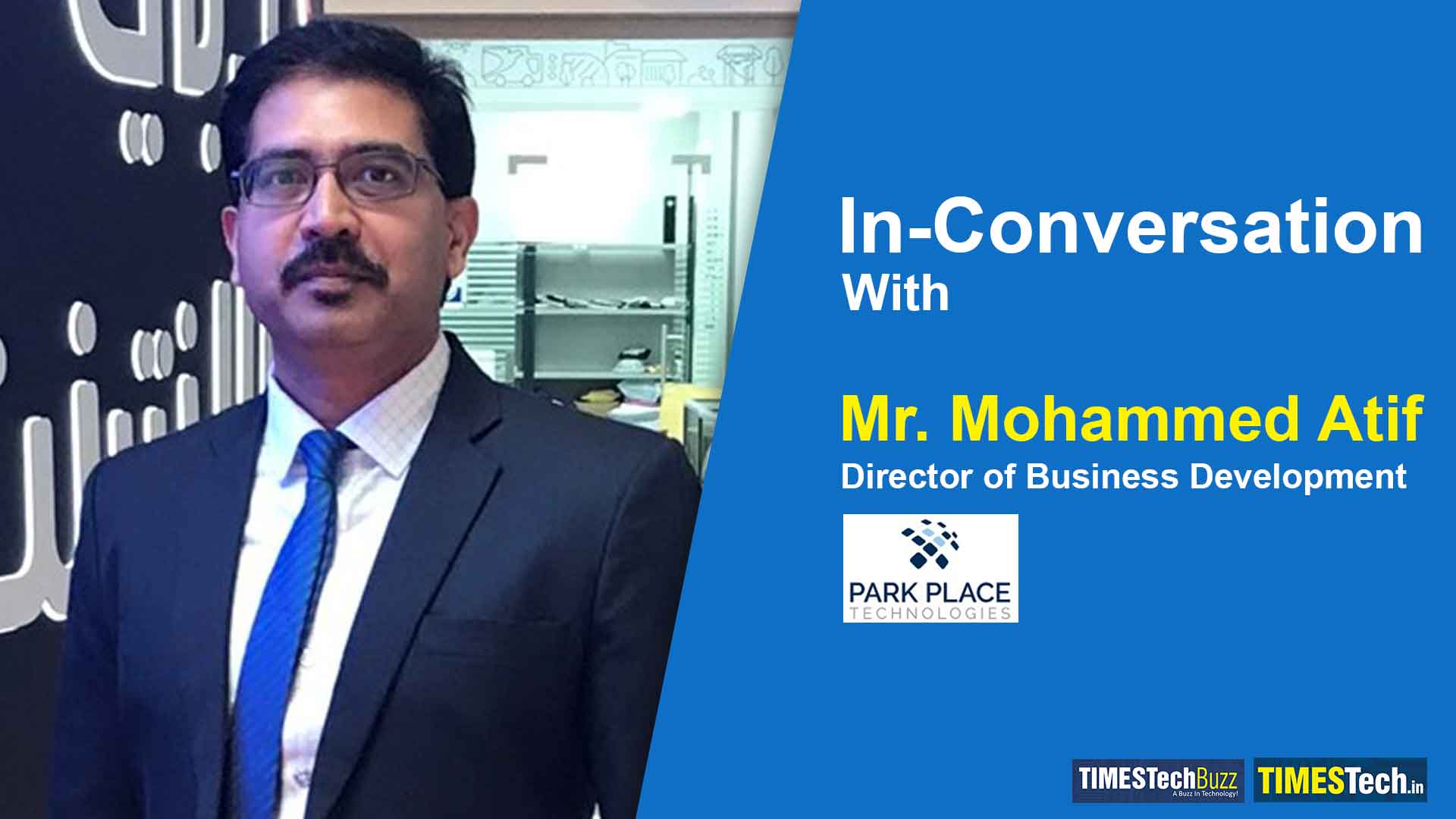In a recent interview with Times Tech, Mohammed Atif, the Director of Business Development at Park Place Technologies, discussed the dynamic landscape of data centers in India. With the growing demand for cloud-based services and the push for sustainability, Atif highlighted key insights on data center evolution, talent shortage, responsible IT practices, and the transformative role of Generative AI. He also provided valuable insights into Park Place Technologies’ strategies for enhancing data center reliability, staying ahead of industry developments, and fostering sustainability in an ever-evolving technological landscape.
Read the full interview:
TimesTech: With the increasing demand for cloud-based services, how do you see the landscape of data centers evolving in India over the next few years?
Mohammed Atif: As more businesses rely on cloud computing and digital services, there is increased pressure to reduce the environmental impact of data centres. This change must be rooted in the ethos of the company. Park Place Technologies, for example, is an environmentally conscious organisation that acknowledges the potential impact that its operations may have on the environment. From team leaders to top management professionals, everyone plays a role in considering environmental impact in planning and day-to-day work. All employees are to ensure that their activities, so far as is reasonably practicable, are carried out without risk to themselves, others, or the environment. This policy and the associated procedures, objectives, and targets are reviewed on a regular basis to ensure that they remain current and applicable to all areas of our business.
The increasing demand for cloud computing, big data, and digital transformation initiatives is also contributing to the intense talent race in this industry, as companies compete to attract skilled professionals to meet the growing demand for their services. There is a shortage of skilled data center professionals in India. Companies are desperate for skilled data center engineers, project managers, network administrators, and security professionals, among others. To address this talent gap, many data center providers are investing in training programs and partnering with educational institutions to offer specialized courses in data center technologies. Some are also offering incentives and benefits to attract and retain talent, such as flexible work arrangements, competitive salaries, and employee development opportunities.
A contributor to the talent shortage is the rate of data center growth in India. The latest IDC reports show that the India public cloud services market revenue totaled $6.2 billion in 2022. It’s expected to reach $17.8 billion by 2027, growing at a CAGR of 23.4% from 2022 to 2027. According to JLL, the Indian data center industry is expected to reach 1,318 MW of data consumption by 2024, more than double the 637 MW reported in H1 2022. Also fueling the growth of data centers in India is The Indian government’s Digital India initiative aimed at driving technology adoption and internet services in the country.
There are several recent expansions to point to that align with these predictions. In March, French software firm OVHcloud (OVH.PA) launched its first data center in India, part of a global push to add 15 new sites around the world by 2024. Other companies are expanding in the region as well. More recently, Equinix, Inc. (Nasdaq: EQUIX) – the world’s largest digital infrastructure company – announced a $42 million investment in its fourth data centre in Mumbai.
TimesTech: As data centers become more complex and interconnected, how can companies ensure effective management and monitoring of these facilities to maintain optimal performance?
Mohammed Atif: Effective data center facility management and monitoring are paramount to optimizing performance. There are several strategies that companies can implement to ensure this.
First, Data Centre Infrastructure Management (DCIM) tools are critical. With the right partner, DCIM provides an all-encompassing view into data center operations, from power and cooling systems to IT equipment, enabling efficient management and monitoring of these facilities. The importance of proactive maintenance can’t be overstated. Regular, anticipatory maintenance can identify and address potential issues early on, preventing downtime and ensuring optimal data center performance.
Artificial intelligence (AI) and machine learning (ML) are increasingly playing a role here as well. AL and ML technologies in data centers are being used to optimise energy consumption, improve cooling systems, and predict equipment failures, ultimately leading to cost savings.
With more complex and interconnected digital systems, security is paramount to mitigate the elevated risk of cyber threats. So, investing in robust cybersecurity measures and training is a must to protect valuable data and maintain smooth operations. As data centers evolve, the personnel managing and monitoring them must be up-to-date with the latest technology and best practices.
The complexity of today’s data centers necessitates a multi-faceted approach to their management and monitoring – an approach that combines cutting-edge tools, proactive practices, top talent, and strategic partnerships. Given the effects of the global IT talent shortage, a professional services company like Park Place Technologies can be a powerful partner to optimise data center performance as it continues to focus on expanding its operations in the country and capitalizing on the growing market opportunity.
How has the introduction of Generative AI into data center management transformed traditional practices, and what benefits has Gen AI brought into data center operations?
Mohammed Atif: AI’s capacity for predicting future data center needs is revolutionising resource planning and allocation. By using historical and real-time data, it can predict potential equipment failures, enabling more proactive maintenance and maximizing uptime. One of the most significant transformations is in automated issue detection and resolution. With Generative AI, we’re seeing a reduction in manual intervention as AI-powered systems are capable of identifying and rectifying common issues, thus improving overall efficiency.
In terms of security, Generative AI has provided a powerful tool to identify and communicate potential risks, then implement preventive measures to enhance the overall data center security framework. It also reduces the chance of human error, thereby improving the reliability and efficiency of operations.
Looking to the future, we can see that Generative AI is facilitating the shift toward more autonomous data centers. This means a world where the majority of management, monitoring, and decision-making processes are automated, dramatically reducing the need for human intervention and allowing for unprecedented efficiency and reliability.
Data center downtime can be costly for businesses. How does Park Place Technologies address the issue of downtime and enhance the reliability and resilience of data centers?
Mohammed Atif: At Park Place Technologies, we are committed to maximizing uptime for our data center customers by enhancing the reliability and resilience of their facilities through a diverse suite of tools and services. We leverage predictive maintenance strategies to proactively identify and resolve potential issues before they escalate into major problems that can cause outages. Our global Enterprise Operations Centers offer 24/7 monitoring and support, ensuring the continuity of operations and swift response to any issues.
The effectiveness of our rapid response is facilitated by our engineers; Park Place Technologies has the world’s largest on-the-ground engineering team, equipped and ready to address any tickets promptly and effectively. Our Parkview Managed Services tool also utilizes cutting-edge AI technology to automate issue detection and resolution, further maximizing uptime.
Resilience is another key aspect of optimal data center operations. Our robust redundancy and backup measures ensure services continue seamlessly, even in the event of component failure. Regular system updates and patching further minimize vulnerabilities that can cause outages. We also provide comprehensive training for IT teams, equipping them with the necessary skills and knowledge to manage their systems effectively and reduce errors.
Finally, we understand that every one of our client’s is unique, so we tailor our service level agreements accordingly to ensure a high level of responsiveness for all our clients’ needs.
How does responsible IT asset disposal contribute to sustainability efforts, and what are the other measures companies can adopt to ensure eco-friendly and socially responsible practices in this process?
Mohammed Atif: Responsible IT asset disposal is a cornerstone of sustainable business practices, helping to curb the rapid expansion of one of the fastest-growing waste streams worldwide – electronics. When managed correctly, the disposal process can recover and recycle valuable materials from obsolete or end-of-life IT equipment, thereby reducing the environmental impact. Moreover, proper disposal methods prevent toxic materials in electronic waste from causing environmental harm and jeopardising public health.
Beyond conscientious asset disposal, companies can further their eco-friendly efforts by embracing energy-efficient data center design and operations to help reduce their carbon footprints. Investment in renewable energy sources for data centers and commitment to carbon neutrality goals can go a long way in reinforcing these sustainability efforts.
Another compelling approach to sustainability in IT is through the adoption of a circular economic model. Park Place Technologies’ Curvature business is devoted to extending the lifespan of IT assets through repair, refurbishment, and resale, rather than discarding them.
It’s also important to recognize the role of education and culture in achieving these sustainability goals. Companies must foster a culture of sustainability within the organisation, educating employees and stakeholders about responsible IT practices.
Looking ahead, what are the key trends and innovations you predict will shape the future of data center optimization in India?
Mohammed Atif: As digital transformation continues in India, data centre optimisation is poised for significant growth as well. Park Place Technologies is prepared to navigate and lead this evolution, guided by legislation, emerging trends, and the latest innovations. Here are some of the most prominent trends that we see shaping the future of data centre optimisation.
Regulations
The Personal Data Protection Bill (PDP) is a huge driver of data centre growth in India, requiring companies to have data storage in the country. The Indian government incentivises companies for setting up data centres in the country, which will eventually turn PM Modi’s vision to “make India a global data centre hub” into a reality. The Digital India initiative is another contributor to data centre growth. Stakeholders hope India will reach the $1 trillion digital economy landmark by 2026 through this legislation, which is further driving demand for data centres across India.
Geographic expansion
As digital transformation accelerates in India, the demand for data centers also increases. Property consultants predict that data center capacity will double in the next year. Mumbai and Pune currently hold the greatest capacity in India, but states beyond Maharashtra are providing incentives for new data centers. In response, operators are making strategic land acquisitions to meet this increased demand.
Edge computing
Edge computing is thought to be the future of computing, according to Gartner. With the market, demand, and innovation surging, edge data centers provide an efficient solution to meet the needs of Artificial Intelligence and Machine Learning applications, Internet of Things (IoT) components, and AR/VR technology.
Large data centers are generally inefficient in electricity, carbon emissions, and electronics waste. Smaller, edge data centers benefit from lower energy consumption for cooling compared to their processing output, but sustainability is still a challenge.
Connectivity
5G satellite broadband from Low Earth Orbit (LEO), plus satellites like SpaceX’s Starlink constellation, offer low-latency and connectivity in remote locations across India. This combination enables Edge data centers in remote regions and improves inter-connectivity with traditional data centers.
As connectivity improves, there’s still a risk that global uncertainty and unrest could disrupt data center service in India. Understanding the impact of these events will lead companies to choose a data center service provider that is able to ensure business continuity regardless of geopolitical climates.
Sustainability to net zero
Data centers have power requirements both for operations and thermal management. Globally data centers are estimated to account for 3% of global power consumption, and that figure is estimated to hit 4% by 2030. This resource drain is attracting more and more interest in designing more sustainable data centre infrastructure. Corporate Social Responsibility initiatives are a great start, but environmentally responsible data centres that use natural resources and renewable energy to run will be the key to carbon neutrality.
At the same time, energy supply in India can be variable. Solar is plentiful and investments are being made in renewable energy sources with storage to provide data centers with more stable, resilient, and reliable power. Another consideration for data center operators is the materials used to build these facilities. Transitioning to building materials and associated suppliers that have a lower carbon impact will be an important cultural shift as well.
TimesTech: How is Park Place Technologies preparing to stay at the forefront of these developments?
Mohammed Atif: Cognisant of these developments, Park Place Technologies is on a mission to stay at the forefront. We are always looking for opportunities to integrate cutting-edge technologies into our tools and services. We are not just investing in technology and talent, but also leading the charge toward sustainable IT practices. By offering comprehensive IT lifecycle management solutions, we are aligning ourselves with the evolving needs of the industry.
The future of data center optimization in India is exciting, and at Park Place Technologies, we’re prepared to lead the way through agility, innovation, and a relentless focus on our customers’ ever-changing needs.















